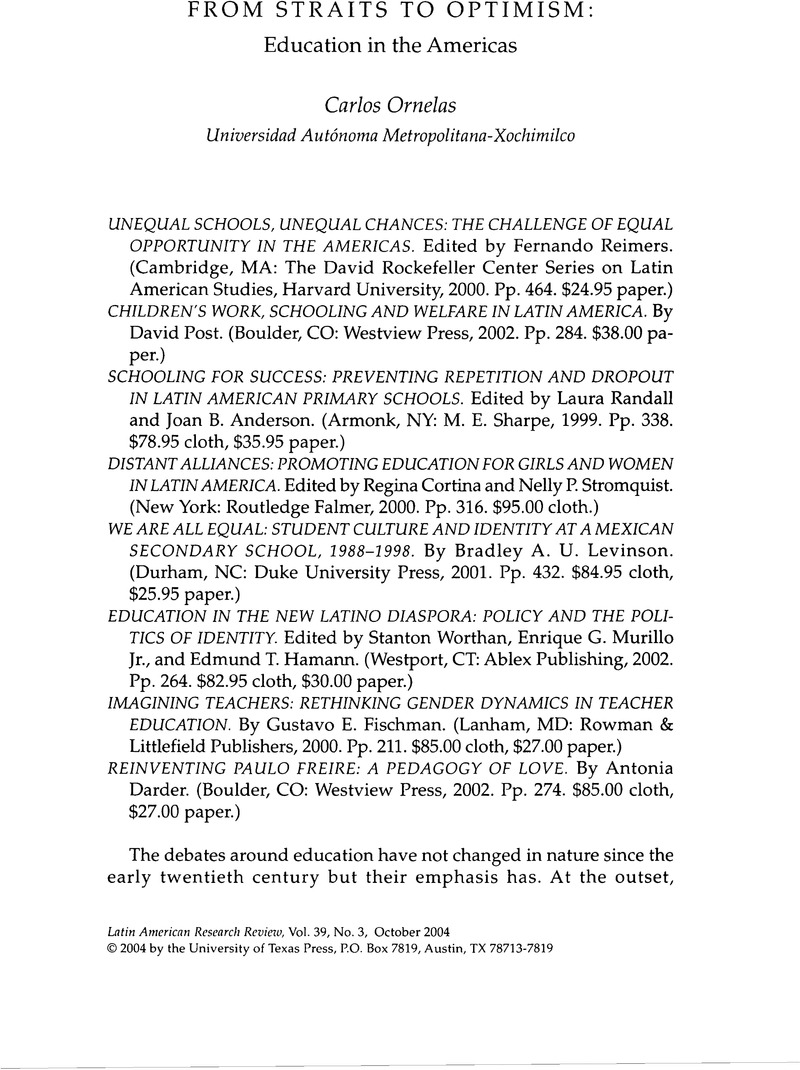Published online by Cambridge University Press: 05 October 2022

1. See Pierre Bourdieu and Jean-Claude Passeron, Reproduction in Education, Society and Culture (London: Sage Publications, 1977); Martin Carnoy, Education as Cultural Imperialism (New York: David McKay, 1974); Samuel Bowles and Herbert Gintis, Schooling in Capitalist America: Educational Reform and the Contradictions of Economic Life (New York: Basic Books, 1976); and Louis Althusser, “Ideology and Ideological State Apparatuses,” in Lenin and Philosophy and Other Essays (New York: New Left Review Press, 1971), 127–87.
2. Although based on many antecedents, the classic citation for this approach is Talcott Parsons, Structure and Processes in Modern Societies (Glenco, IL: The Free Press of Glencoe, 1960).
3. Reimers's book was published in Madrid, Spain, for Editorial La Muralla, under the title, Distintas Escuelas, Diferentes Oportunidades, in 2002.
4. Chapter 15 by Gary Orfield (Reimers 2000), seems inappropriate for this volume. It deals with equity and policies in the United States. The author argues that the essay is relevant to the themes of the book and suggests that it is so because of the influence and power of the United States and the diffusion of its innovations by international agencies and donors. Yet its analysis has nothing to do with Latin America. The commentary by Emily Hannun to the paper of Carlos Muñoz Izquierdo and Raquel Ahuja Sánchez is a brief summary.
5. Fernando Reimers, “Educational Opportunities and Policy in Latin America” in Fernando Reimers (ed.), Unequal Schools, Unequal Chances: The Challenges to Equal Opportunity in the Americas (Cambridge, MA: The David Rockefeller Center Series on Latin American Studies, Harvard University, 2000), 100.
6. The Post book was published in Spanish by the Fondo de Cultura Económica (Mexico) in the first quarter of 2003.
7. Joan B. Anderson and Laura Randall, “Conclusion: Improving Basic Education in Latin America”, in Joan B. Anderson and Laura Randall, Schooling for Success: Preventing Repetition and Dropout in Latin American Primary Schools (Armonk, NY: M.E. Sharpe, 1999), 311.
8. There is a vacuum in the study of the politics of teachers' unions in Latin America. But see Maria Victoria Murillo “Recovering Political Dynamics: Teachers' Unions and the Decentralization of Education in Argentina and Mexico,” Journal of Inter-American Studies and World Affairs 41, no. 1 (Spring 1999): 31–57.
9. This book was published in Spanish as Promoviendo la educación de mujeres y niñas en América Latina (México, DF: Editorial Pax México, 2001).
10. Incidentally, one of the proposals often put forward is to decentralize education. I am skeptical of this move. My own research on education decentralization in Mexico, leads me to conclude that in so doing central governments, in fact, decentralize management and some degrees of authority, but centralize power.